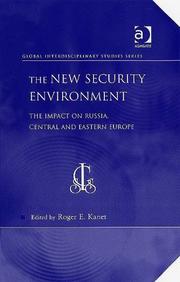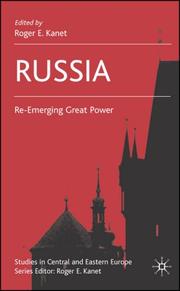| Listing 1 - 10 of 37 | << page >> |
Sort by
|

ISBN: 0754643301 9780754643302 Year: 2005 Publisher: Aldershot, Hants, England: Ashgate,
Abstract | Keywords | Export | Availability | Bookmark
 Loading...
Loading...Choose an application
- Reference Manager
- EndNote
- RefWorks (Direct export to RefWorks)
Security, International --- National security --- Russia (Federation) --- Europe, Eastern --- United States --- Foreign relations --- Security, International. --- Foreign relations. --- Security, International.Europe, Eastern --- United StatesForeign relations. --- #SBIB:327.5H10 --- #SBIB:328H262 --- #SBIB:328H27 --- Strategie: algemeen --- Instellingen en beleid: Rusland en het GOS --- Instellingen en beleid: Midden- en Centraal Europa: algemeen --- Collective security --- International security --- Homeland defense --- Homeland security --- International relations --- Disarmament --- International organization --- Peace --- National security - Russia (Federation) --- National security - Europe, Eastern --- National security - United States --- Russia (Federation) - Foreign relations --- Europe, Eastern - Foreign relations --- United States - Foreign relations
Book
ISBN: 9780415460224 0415460220 Year: 2008 Publisher: London: Routledge,
Abstract | Keywords | Export | Availability | Bookmark
 Loading...
Loading...Choose an application
- Reference Manager
- EndNote
- RefWorks (Direct export to RefWorks)
This book focuses on questions of identity that have confronted the countries of Central and Eastern Europe after the collapse of the communist system that had previously provided them with an identity. This development both facilitated and necessitated a reassessment of the now independent nations' history, orientation, symbols and identity. In some cases, new states were created without a clear national identity, while in others the nation was regaining statehood, but not always within borders that had an historical association with the nation concerned.The multiethnic character of the space of the former Soviet Union and its erstwhile "satellites," and the long historical legacy of complex relations, boundary changes, population migration, and economic and social changes presented different challenges to the various nations and states concerned. The essays in this volume attempt to elucidate and understand the issues of ethnic and national identity and their relationship to the emerging statehood in various regions of the post-communist world. This study makes clear that some nation-states were far better prepared to handle these issues than others, and that the longer-term impact of the communist experience has varied. This book was previously published as a special issue of "Nationalities Papers"
Group identity --- Post-communism --- Collective memory --- Democracy --- National security --- Europe, Eastern --- Social conditions --- Politics and government --- Group identity - Europe, Eastern --- Post-communism - Europe, Eastern --- Collective memory - Europe, Eastern --- Democracy - Europe, Eastern --- National security - Europe, Eastern --- Europe, Eastern - Social conditions - 1989 --- -Europe, Eastern - Politics and government - 1989 --- -Group identity - Europe, Eastern --- -Group identity
Book
ISBN: 9780230271678 0230271677 Year: 2010 Publisher: Houndmills: Palgrave MacMillan,
Abstract | Keywords | Export | Availability | Bookmark
 Loading...
Loading...Choose an application
- Reference Manager
- EndNote
- RefWorks (Direct export to RefWorks)
After the collapse of the Soviet Union expectations were high in both Russia and the West that a 'new world order' was emerging in which Russia and the other former Soviet republics would join the Western community of nations. That has not occurred. In Russian Foreign Policy in the 21st Century a distinguished group of analysts from Russia, Europe and North America explains the reasons for this failure and assesses likely future developments in that relationship. The authors explore the importance of Western policies in the 1990s in 'nationalizing' Russian views of their interests; the commitment of President Putin to rebuilding Russia as a great power (beginning in former Soviet space); and the deterioration of Russian relations with the European Union and the United States during the first decade of the 21st century.

ISBN: 052134459X 0511628366 Year: 1987 Publisher: Cambridge : Cambridge university press,
Abstract | Keywords | Export | Availability | Bookmark
 Loading...
Loading...Choose an application
- Reference Manager
- EndNote
- RefWorks (Direct export to RefWorks)
Soviet policy towards the countries of Asia, Africa and Latin America has undergone substantial expansion and change during the three decades since Khrushchev first initiated efforts to break out of the international isolation in which the USSR still found itself in the immediate post-Stalin years. Over the course of the past thrity years the Soviet Union has expanded significantly both the geographical range of its involvement with developing countries, and the intensity of its political, military and economic activities. Moreover the USSR has increasingly acted in consort with 'allies' such as Cuba and the countries of Eastern Europe. The studies in this volume, first published in 1988, examine various aspects of Soviet and East European policy towards the Third World.
International relations. Foreign policy --- Development aid. Development cooperation --- Russia --- Developing countries --- Soviet Union --- Europe, Eastern --- Foreign relations --- Congresses. --- Congresses --- Europe [Eastern ] --- Social Sciences --- Political Science --- Emerging nations --- Fourth World --- Global South --- LDC's --- Least developed countries --- Less developed countries --- Newly industrialized countries --- Newly industrializing countries --- NICs (Newly industrialized countries) --- Third World --- Underdeveloped areas --- Underdeveloped countries --- East Europe --- Eastern Europe --- Советский Союз --- Ber. ha-M. --- Związek Socjalistycznych Republik Radzieckich --- ZSRR --- Związek Socjalistycznych Republik Sowieckich --- ZSRS --- Szovjetunió --- TSRS --- Tarybų Socialistinių Respublikų Sąjunga --- SRSR --- Soi︠u︡z Radi︠a︡nsʹkykh Sot︠s︡ialistychnykh Respublik --- SSSR --- Soi︠u︡z Sovetskikh Sot︠s︡ialisticheskikh Respublik --- UdSSR --- Shūravī --- Ittiḥād-i Jamāhīr-i Ishtirākīyah-i Shūrāʼīyah --- Russia (1923- U.S.S.R.) --- Sovetskiy Soyuz --- Soyuz SSR --- Sovetskiĭ Soi︠u︡z --- Soi︠u︡z SSR --- Uni Sovjet --- Union of Soviet Socialist Republics --- USSR --- SSṚM --- Sovetakan Sotsʻialistakan Ṛespublikaneri Miutʻyun --- SSHM --- Sovetakan Sotsʻialistakan Hanrapetutʻyunneri Miutʻyun --- URSS --- Unión de Repúblicas Socialistas Soviéticas --- Berit ha-Moʻatsot --- Rusyah --- Ittiḥād al-Sūfiyītī --- Rusiyah --- Rusland --- Soṿet-Rusland --- Uni Soviet --- Union soviétique --- Zȯvlȯlt Kholboot Uls --- Związek Radziecki --- ESSD --- Sahaphāp Sōwīat --- KhSHM --- SSR Kavširi --- Russland --- SNTL --- PSRS --- Su-lien --- Sobhieṭ Ẏuniẏana --- FSSR --- Unione Sovietica --- Ittiḥād-i Shūravī --- Soviyat Yūniyan --- Russian S.F.S.R.
Book
ISBN: 3319507753 3319507745 9783319507743 Year: 2017 Publisher: Cham: Palgrave MacMillan,
Abstract | Keywords | Export | Availability | Bookmark
 Loading...
Loading...Choose an application
- Reference Manager
- EndNote
- RefWorks (Direct export to RefWorks)
“This volume pulls together a group of experts from both Russia and the West to examine the factors that have led ? some would say inexorably - to the current confrontation between Putin?s Russia and the West. And even if we prefer not to call it a ?new? cold war we can all agree that the positive relationship that many looked forward to after 1991 has soured badly. Whether or not the new US president can ?reset? the relationship remains to be seen. But perhaps one place he might think of looking first to get him up to speed on modern Russia and its troubled relationship with the West might be Roger Kanet?s terrific collection.” Michael Cox, Founding Director of LSE IDEAS, UK “In this excellent book, noted specialists from Russia, Europe and the United States trace the evolution of post-Cold War tensions between Russia and the West, and detail how the Ukrainian crisis thrust these conflicting interests into sharp relief. Through a series of miscalculations?and misunderstandings?Russia and NATO now appear closer to military conflict than at any time in the past three decades. The authors of this timely collection provide a judicious and sober assessment of what many have called the new Cold War. Highly recommended.” Charles E. Ziegler, University of Louisville, USA Roger Kanet, a respected expert on the Soviet Union and post-Soviet Russia, has assembled a stellar team of scholars, from Russia and the West, to examine Russia?s policy toward Europe. The individual chapters offer well-researched, provocative, and contrasting assessments, using theoretical frameworks ranging from realism to constructivism. Russia?s annexation of Crimea and support for the rebellion in Ukraine?s east have ignited a heated debate over the factors shaping Russian policy in Europe. That makes this superb volume particularly timely. Rajan Menon, City University of New York, USA Roger E. Kanet is Professor of Political Science at the University of Miami. He has also taught at the University of Kansas and the University of Illinois at Urbana-Champaign. .
Political science. --- Europe --- Russia --- Political Science and International Relations. --- Russian and Post-Soviet Politics. --- European Politics. --- Politics and government. --- Politics and government --- Administration --- Civil government --- Commonwealth, The --- Government --- Political theory --- Political thought --- Politics --- Science, Political --- Russia-Politics and government. --- Europe-Politics and government. --- Russia—Politics and government. --- Europe—Politics and government. --- Environmental policy - Europe --- Political science --- Europe - Politics and government --- Russia (Federation) - Politics and government --- Environmental policy --- Russia (Federation)

ISBN: 9780230543041 0230543049 Year: 2007 Publisher: Houndmills : Palgrave,
Abstract | Keywords | Export | Availability | Bookmark
 Loading...
Loading...Choose an application
- Reference Manager
- EndNote
- RefWorks (Direct export to RefWorks)
#SBIB:328H262 --- Instellingen en beleid: Rusland en het GOS
Book
ISBN: 9789089790088 Year: 2009 Publisher: Dordrecht Republic of letters
Abstract | Keywords | Export | Availability | Bookmark
 Loading...
Loading...Choose an application
- Reference Manager
- EndNote
- RefWorks (Direct export to RefWorks)
Book
ISBN: 9781351181235 1351181238 9781351181242 1351181246 9781351181228 135118122X 9781351181211 1351181211 9780815396710 9780367783938 0815396716 0367783932 Year: 2019 Publisher: London: New York: Routledge/Taylor & Francis Group,
Abstract | Keywords | Export | Availability | Bookmark
 Loading...
Loading...Choose an application
- Reference Manager
- EndNote
- RefWorks (Direct export to RefWorks)
Book
Year: 1975 Publisher: New York (N.Y.): Praeger,
Abstract | Keywords | Export | Availability | Bookmark
 Loading...
Loading...Choose an application
- Reference Manager
- EndNote
- RefWorks (Direct export to RefWorks)
Book
Year: 1971 Publisher: New York (N.Y.) : Free press,
Abstract | Keywords | Export | Availability | Bookmark
 Loading...
Loading...Choose an application
- Reference Manager
- EndNote
- RefWorks (Direct export to RefWorks)
Political science --- Research. --- Methodology. --- Soviet Union --- Europe, Eastern --- Politics and government.
| Listing 1 - 10 of 37 | << page >> |
Sort by
|

 Search
Search Feedback
Feedback About UniCat
About UniCat  Help
Help News
News